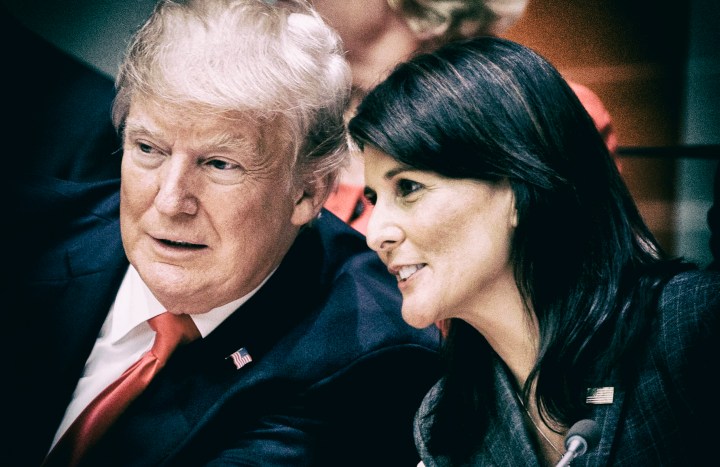Act of Retaliation
Trump rejects SA’s appeal for exemptions to high steel and aluminium import tariffs

Was this retaliation for South Africa repeatedly voting against the United States in the United Nations General Assembly?
Was it just a coincidence that US President Donald Trump rejected South Africa’s request for exemption from tough new import tariffs on steel and aluminium, just after his UN ambassador Nikki Haley had warned Pretoria and other capitals that it might retaliate against them for voting so often against the US in the UN?
It’s hard not to connect the two events. If they are linked, it would mean Trump has become the first US president since 1994 to make the ANC government pay for its frequent anti-US positions at the UN. Previous presidents have kept binational economic policy and multinational political policy separate from each other.
Trump issued two proclamations on Monday announcing exemptions to the 25% import tariff on steel and the 10% import tariff on aluminium, which he had announced in March. He extended exemptions for South Korea, Canada, Mexico, Australia, Argentina, Brazil and the member countries of the European Union.
These exemptions are subject to negotiations on matters such as quotas. But Trump also announced that the tariffs would remain in place for all other countries. By implication, this included South Africa.
Trade and Industry Minister Robert Davies announced in March that South Africa had also applied to the US Trade Representative (USTR) for a country exemption from the tariffs, on grounds that South Africa’s exports of iron and steel to the US were too small to present a threat to US national security or to US steel and aluminium manufacturers. South Africa also agreed to a quota restricting exports to the US to 2017 levels.
Department of Trade and Industry (DTI) spokesperson Sidwell Medupe said on Tuesday that South Africa was disappointed that despite these representations, the US had still turned down its request for an exemption. He said in its comprehensive representations for exemption, South Africa had pointed out that its aluminium exports to the US represented only 1,6% of total US aluminium imports, while South African steel exports to the US represented only 0,98% of total US steel imports. So South Africa did not pose a threat to US interests, and in fact was providing strategic primary and secondary products used in further value-added manufacturing in the US. The South African government had also assured the US there was no risk of other major steel and aluminium producers shipping their products to the US through South Africa because of effective customs controls.
Medupe complained that South Africa was suffering “collateral damage in the trade war of key global economies” who were exporting far greater quantities of iron and steel to the US than South Africa did.
He said the loss of sales to the US would have a major impact on South Africa. For instance, the 330,000 tons of steel which South Africa exported to the US in 2017 represented 5% of total South African production and about 7,500 jobs in the steel supply chain.
Medupe urged South African steel and aluminium companies exporting to the US to engage with their US buyers to consider applying for exemptions for individual products, under a process run by the US Commerce Department rather than the USTR.
Cynthia Harvey, spokesperson for the US Embassy in Pretoria, suggested that the door was not yet completely closed to South Africa for getting an exemption. She said Trump had made a determination on which countries should be exempt based on factors which included “not only the nature of our security relationship with partners, but also the extent to which we and partners have been able to arrive at satisfactory alternative means to address the threatened impairment to US national security caused by steel and aluminium imports.
“Countries have discussed with us possible alternative means to address our concern. The president is considering the national security aspects of these alternatives on a case-by-case basis.”
But did Trump also take into account, when deciding not to include South Africa among the exemptions, the sort of negative perceptions of South Africa which had just been expressed by his UN ambassador Nikki Haley?
On Thursday her office released a statement saying that the US State Department had just released its annual UN Voting Practices Report as required by Congress for the last 34 years.
It had found that on 93 resolutions that were voted on by the UN General Assembly last year, on average other countries voted with the United States only 31 percent of the time –“a 10 percentage point drop from 2016, but at a rate that is historically near average”.
This, Haley’s office said, was in spite of America’s “generosity” in paying 22% of the UN budget – “more than the next three highest donor countries combined”. This was “not an acceptable return on our investment. When we arrived at the UN last year, we said we would be taking names, and this list of voting records speaks for itself.
“President Trump wants to ensure that our foreign assistance dollars – the most generous in the world – always serve American interests, and we look forward to helping him see that the American people are no longer taken for granted.”
The statement went on to say the ten countries which had voted most often with the US were Israel, Micronesia, Canada, Marshall Islands, Australia, the United Kingdom, France, Palau, Ukraine, and the Czech Republic.
“The ten countries with the lowest voting coincidence with the United States were Zimbabwe, Burundi, Iran, Syria, Venezuela, North Korea, Turkmenistan, Cuba, Bolivia, and South Africa.” DM

















 Become an Insider
Become an Insider